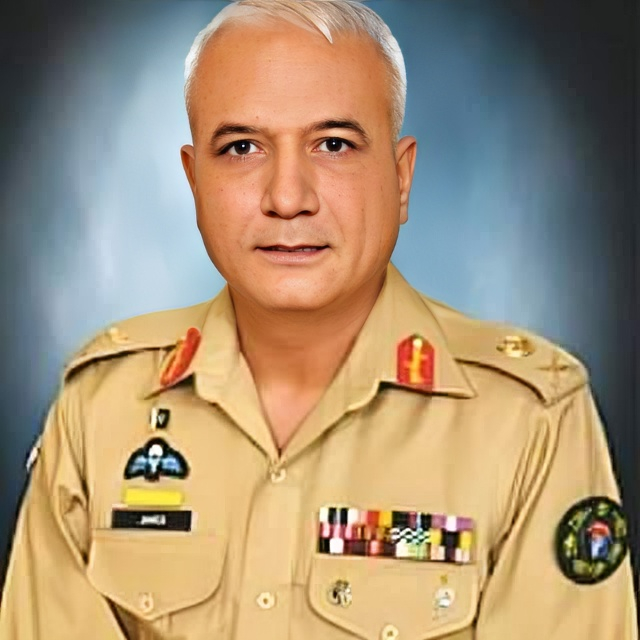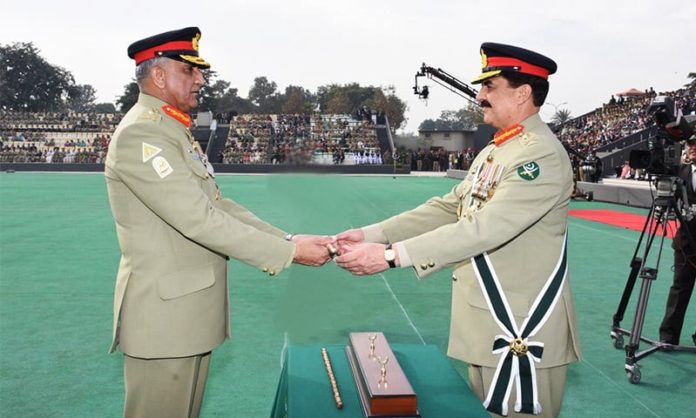A new Army Chief would normally not warrant special media or public attention in most countries but in Pakistan the situation is a vastly different. The Washington Post says, “for the first time in 20 years, the most powerful official in Pakistan — a U.S. Cold War and anti-terrorism ally in which generals have often interfered in civilian rule — was keeping his pledge to retire on time and turn over his job to a successor chosen by the prime minister”, unquote. Had Gen Raheel Shareef’s predecessors stuck to their normal 3-year tenures Pakistan Army would have had 21 Army chiefs instead of the 16 we now have.
Hanging up his boots on Nov 29 in a manner befitting a patriotic soldier, Gen Raheel Shareef set precedents enhancing the prestige of his institution. By resisting the temptation to take over despite given a basket of opportunities on a platter, he promoted the cause of democracy. At a glittering ceremony Gen Qamar Javed Bajwa took over as the new COAS Pakistan Army. A thoroughly competent professional, the outgoing COAS enjoyed unprecedented popularity among the broad mass of the populace who adored and glorified him as a soldier who was always true to his word.
To his credit Gen Raheel Sharif distanced the army from Musharraf’s 8 years of total control of the political process, refusing to be distracted from the parameters of his constitutional responsibilities. Having learnt lessons from the Musharraf era and Kayani’s being compromised because of his siblings and by seeking extension, this was a very sensible and pragmatic re-positioning. Mindful of their institutional parameters within the Constitution and contrary to public perception most of the military hierarchy do not want to get involved in running the country. Gen Bajwa has been vocal against army intervention. The army can definitely give advice or/and input without coming into the limelight. Gen Raheel Shareef maintained the army’s influence within Pakistani politics by becoming a key player behind-the-scenes without interfering overtly. While Gen Raheel Shareef has left behind pretty big shoes to fill, Qamar Bajwa will take some time to come to terms with the strategic dimensions emanating from the COAS Chair. His first priority is consolidation, promoting some Maj Gens to Lt Gens rank to fill vacant posts (if those superceded opt to retire as is the tradition).
Having an extremely impressive military resume, Lt Gen Ishfaq Nadeem is credited as Chief of General Staff (CGS) for creating the blueprint for “Zarb-e-Azb” – the Army’s war against the terrorists. Believed to be Gen Raheel Shareef’s preferred choice, he has served in Swat and Waziristan in Brigadier and major general’s rank. His reputation of being blunt and straightforward is probably why he was overlooked.

Having witnessed Lt Gen Javed Iqbal Ramdey’s progress from Subaltern’s rank in my unit 4 Sindh, it has been a matter of great pride and satisfaction to see this upright and outstanding soldier remain true to his profession and conscience throughout his career. Javed was wounded as GOC Swat when his helicopter came under fire in 2011 during Operation “Rah-e-Nijat”. Posted to National Defence University (NDU) in 2012, he became its President in 2013. In 2015 he took over as Commander 31 Corps at Bahawalpur. He probably lost out because the Sharif’s feared criticism at his promotion because of his family links with them.
Commissioned into 16 Baluch, a unit which this father also commanded, Gen Bajwa brings with him a wealth of experience and professional acumen. As Commandant Infantry School he oversaw the sea-change in the application of the new doctrine to engage the emerging threat of internal militancy. As Commander 10 Corps, his responsibilities carried extremely sensitive tasks, including the management of the Line of Control (LoC). His last posting was Inspector General of Training and Evaluation (IGTE) at GHQ. His colleagues consider him to be an outstanding soldier who does not stand on protocol and mixes well with his colleagues. Speaking to the Press Trust of India former Indian Army Chief Gen Bikram Singh, Bajwa’s superior during his UN assignment and not known for having any love lost for Pakistan, described him as “a thorough professional who gave an outstanding performance in Congo”. Bajwa’s immediate first appointment, Lt Gen Aamir Riaz Commander Southern Command as CGS, is an indicator of continuity of Raheel Shareef’s legacy. Aamir Riaz served as DGMO with Ishfaq Nadeem during the planning and execution of Operation Zarb-i-Azb.
Contrast the media gushing over the new COAS to the almost reluctant coverage given to Chairman JCSC, highlighting one of the great hypocrisies and anomalies of our command structure. To quote my article titled “Changing the Guard” of Dec 5, 2013, “Once when I asked the rhetorical question, what does the Chairman JCSC do for a living, the than incumbent Tariq Majeed took it to his arrogant heart and flew off the handle, spoiling my relationship with a military intellectual one had a lot of time for, then ISPR Chief Maj Gen Athar Abbas. In modern warfare it is vital to have an “integrated higher command” structure, in Pakistan this great anomaly continues to survive in a very professional Armed Forces. Can those with conscience accept this lack of cohesive coordination at the higher command level that (has previously) will spell disaster on future war performance? Is the individual’s hankering for the COAS power appointment more important than the existence of the country?”
One must credit Nawaz Sharif for not being swayed by the vicious lies being propagated on the social media about the new COAS even before his appointment, an age-old ploy to keep merit from advancement. Nawaz Sharif’s handling of the “dirty tricks” will define the fake democracy in the future. Hopefully this is not being kept in reserve as potential “Sword of Democrats” for eventual blackmail “as and when required”. All the candidates short-listed were extremely deserving, having requisite seniority, experience, and professional competency. Gen Bajwa’s vocal support of the democratic system carried more weightage because it translates into better working relations with the civilian govt.
The PM would have been hard put to get somebody who is a pushover in the present military hierarchy. While merit, combat experience and/ or being straightforward could have acted as disqualifiers for Ishfaq and Javed, only time will tell if Nawaz Sharif is third time lucky. Given the reputation that he deservedly has, Gen Bajwa will be true to the country. That means, notwithstanding any other consideration, being first true to the uniform and the institution he is privileged to command.




